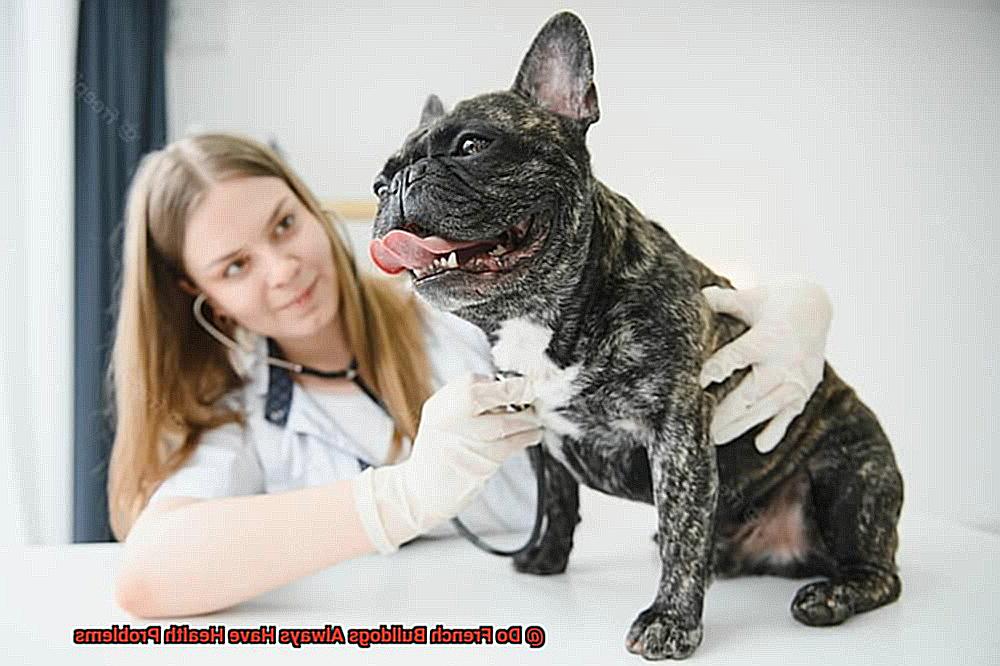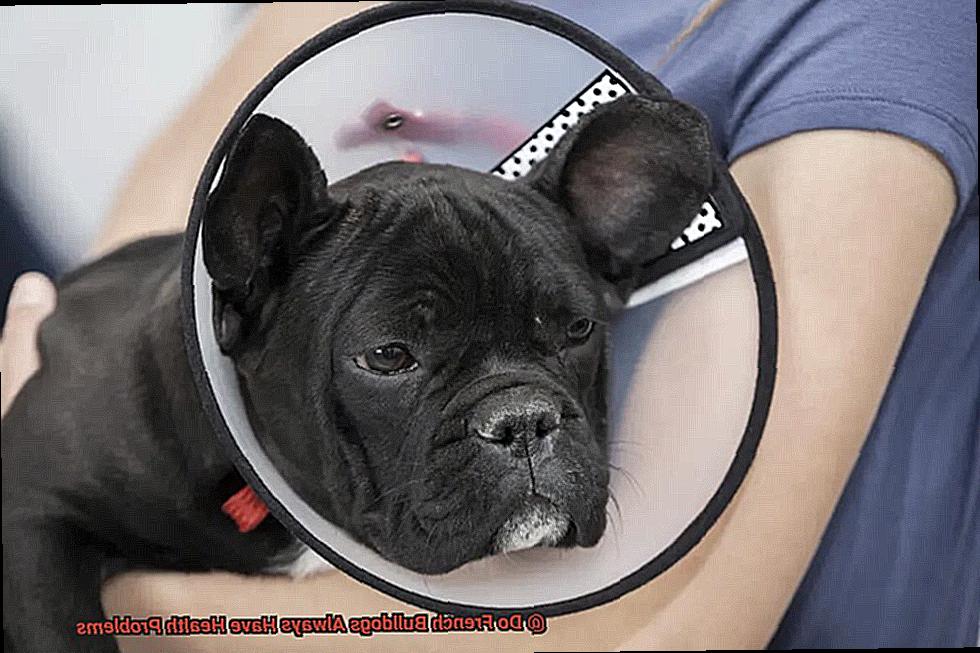Do French Bulldogs Always Have Health Problems?
Title: Demystifying French Bulldogs: Unraveling the Truth About Their Health
Introduction:
Contents [show]
Are French Bulldogs really the epitome of good health and vitality, or are they plagued with a laundry list of health issues? The answer lies somewhere in between. French Bulldogs, with their unmistakable bat-like ears and irresistible charm, have skyrocketed in popularity. But with popularity comes questions about their well-being.
Contrary to popular belief, French Bulldogs are not invincible. Like any other breed, they too can be afflicted by certain health conditions. However, it’s important to separate myths from facts and understand the genuine concerns that French Bulldogs may face throughout their lives.
In this blog post, we dive into the fascinating realm of French Bulldog health issues, providing reliable information backed by expert opinions. While each dog is unique, it’s unfair to label an entire breed based on a few predispositions. So let’s explore the truth behind French Bulldogs’ health, dispel myths, and uncover the realities that potential owners should know.
Join us on this informative journey as we debunk misconceptions, shed light on valid concerns, and empower potential French Bulldog owners to make informed decisions about their furry companions’ health and well-being.
Do French Bulldogs always have health problems
However, they have also gained a reputation for potential health problems. While it is true that this breed may be prone to certain issues, it is important to understand that not all French Bulldogs will experience health problems throughout their lives. In this article, we will explore the common health concerns associated with French Bulldogs and shed light on why not every individual dog will be affected.
Brachycephalic Airway Syndrome:
One of the primary health issues in French Bulldogs is brachycephalic airway syndrome. This condition arises from their unique facial structure, characterized by a short nose and flattened face. While it is true that many French Bulldogs may have breathing difficulties, not all will experience severe symptoms. With proper care, including avoiding excessive heat exposure and providing a well-ventilated environment, the impact of this syndrome can be minimized.
Obesity:
French Bulldogs are known for their love of food, but this can lead to weight gain and associated health problems. However, not all French Bulldogs will become obese. By maintaining a balanced diet and engaging in regular exercise, owners can help their French Bulldogs stay fit and avoid weight-related health issues such as joint problems, heart disease, and diabetes.
Genetic Conditions:
French Bulldogs may be predisposed to certain genetic conditions like hip dysplasia and intervertebral disc disease. However, responsible breeding practices and regular veterinary check-ups can help identify these conditions early on and manage them effectively. It is important to note that not all French Bulldogs will develop these conditions.
Sensitive Skin:
French Bulldogs have sensitive skin, which makes them more prone to allergies and dermatological issues. However, not every individual dog will experience chronic skin problems. Regular grooming, appropriate skincare, and a healthy diet can go a long way in maintaining their skin health and reducing the occurrence of skin issues.
What is Brachycephalic Syndrome in French Bulldogs?
French Bulldogs are undeniably adorable, with their squished faces and expressive eyes. However, their unique head structure puts them at risk for a condition called Brachycephalic Syndrome. In this blog post, we will delve into the details of this syndrome, its causes, symptoms, and management strategies, so you can better care for your beloved French Bulldog.
What is Brachycephalic Syndrome?
Brachycephalic Syndrome is a collection of respiratory problems that commonly affect brachycephalic breeds such as French Bulldogs. These problems are caused by the anatomical features of their flat faces, shortened skulls, and narrowed nostrils. Let’s take a closer look at the specific components of this syndrome:
Stenotic Nares:
Stenotic nares refer to abnormally narrow nostrils. This restricts airflow, making it difficult for your French Bulldog to breathe properly. It can lead to symptoms such as snoring, snorting, and respiratory distress during physical activity or in hot weather.
Elongated Soft Palate:
The soft palate is the tissue at the back of your dog’s throat that separates the oral and nasal cavities. In brachycephalic breeds, this tissue can become longer than normal, partially blocking the airway. Signs of an elongated soft palate include snoring, snorting, gagging, and episodes of choking.
Everted Laryngeal Saccules:
The laryngeal saccules are small pouches located within the larynx. In Brachycephalic Syndrome, these saccules can become inflamed and protrude into the airway, further obstructing breathing.
Collapsing Trachea and Laryngeal Collapse:
The trachea carries air from the nose and mouth to the lungs, while the larynx helps regulate airflow. In some cases, the trachea or larynx can become weak or malformed, leading to collapse and obstruction of the airway.
Other Health Issues Associated with Brachycephalic Syndrome:
Apart from respiratory problems, French Bulldogs with Brachycephalic Syndrome may also experience dental issues, skin fold dermatitis, eye conditions like cherry eye and dry eye, and heat intolerance. These additional health problems can significantly impact your dog’s quality of life.
Recognizing the Signs and Seeking Veterinary Care:
It is crucial for French Bulldog owners to be aware of the signs and symptoms of Brachycephalic Syndrome. Keep an eye out for noisy breathing, excessive panting, fatigue, difficulty exercising, and fainting spells. If you suspect your French Bulldog may have Brachycephalic Syndrome, it is important to consult a veterinarian for a proper diagnosis and treatment options.
Allergies and Skin Problems in French Bulldogs
Allergies and skin problems can be quite common in French Bulldogs due to their sensitive skin and unique facial structure. As a French Bulldog owner, it’s important to be aware of these issues and know how to manage them effectively. In this section, we will dive into the different allergies and skin problems that French Bulldogs are prone to, as well as provide tips on how to handle them.
Food allergies are a common concern for French Bulldogs. They can be sensitive to certain ingredients such as grains, dairy, or poultry, which can cause skin irritations, itching, and gastrointestinal problems. If you suspect that your Frenchie has a food allergy, it’s best to consult with your veterinarian and consider an elimination diet to identify the specific ingredient causing the reaction.
Environmental allergies are also prevalent in French Bulldogs. They can react to pollen, dust mites, mold spores, or certain chemicals, resulting in symptoms like itching, redness, sneezing, and respiratory issues. To manage environmental allergies, it’s important to reduce exposure to known allergens. Regular cleaning of your home, using hypoallergenic bedding, and avoiding chemical-laden products can help alleviate symptoms.
French Bulldogs are also prone to developing atopic dermatitis, a chronic skin condition characterized by inflamed and itchy skin. This condition can be triggered by environmental allergens or certain foods. Identifying the specific allergens through allergy testing or elimination diets can help manage atopic dermatitis effectively.
Another common skin problem in French Bulldogs is pyoderma, which is a bacterial infection of the skin. The folds and wrinkles on their face and body can trap moisture and debris, creating a perfect breeding ground for bacteria. To prevent pyoderma, it’s important to keep your Frenchie’s skin clean and dry. Regularly cleaning their facial wrinkles and body folds with gentle wipes or a damp cloth can help prevent bacterial growth.
French Bulldogs also have a high risk of developing interdigital cysts, which are painful fluid-filled swellings that occur between the toes. These cysts can be caused by allergies, infections, or foreign objects getting lodged between the toes. Keeping your Frenchie’s paws clean and inspecting them regularly can help identify any issues early on.
Managing allergies and skin problems in French Bulldogs involves a multifaceted approach. In addition to avoiding allergens and keeping their skin clean, providing a balanced diet with high-quality ingredients can improve their overall health and reduce the risk of food allergies. Regular grooming is also essential to maintain good skin health.
In severe cases of allergies or chronic skin problems, veterinary intervention may be necessary. Your veterinarian may prescribe medications such as antihistamines, corticosteroids, or immune-modulating drugs to alleviate symptoms and manage the underlying condition.

Genetic Disorders Common to French Bulldogs
French Bulldogs are adorable and lovable companions, but like any other breed, they are prone to certain genetic disorders that can affect their health and well-being. As an expert in French Bulldog genetics, I want to shed light on these common disorders and provide you with insights on how to manage them effectively.
- Brachycephalic Airway Syndrome: This is one of the most prevalent genetic disorders in French Bulldogs. Their short snouts and flat faces make it difficult for them to breathe properly, leading to snoring, wheezing, and even heat stroke in extreme cases. It’s important to keep your Frenchie cool and avoid strenuous exercise in hot weather. Regular check-ups with a veterinarian can help monitor their airway health.
- Hip Dysplasia: Another common disorder in French Bulldogs is hip dysplasia, where the hip joint does not develop properly. This can cause pain, lameness, and difficulty in walking or running. To manage this condition, maintaining a healthy weight and providing low-impact exercise can help alleviate symptoms. In severe cases, surgical intervention may be necessary.
- Intervertebral Disc Disease: French Bulldogs are prone to developing intervertebral disc disease, which affects the discs between their vertebrae. This can lead to pain, weakness, and even paralysis. Avoiding jumping or excessive rough play can help prevent this condition. If your Frenchie shows signs of back pain or mobility issues, consult with a veterinarian for proper diagnosis and treatment options.
- Patellar Luxation: Patellar luxation occurs when the kneecap slips out of its normal position. This can cause lameness and difficulty in walking. Regular exercise and maintaining a healthy weight can help prevent this condition. In severe cases, surgery may be required to correct the issue.
- Skin Allergies and Dermatitis: French Bulldogs often suffer from skin allergies and dermatitis. These can be caused by environmental factors, food allergies, or contact allergies. Regular grooming and a hypoallergenic diet can help manage these conditions. It’s important to consult with a veterinarian to accurately diagnose the specific allergens affecting your Frenchie.
- Eye Disorders: French Bulldogs are prone to various eye disorders, including cherry eye, cataracts, and corneal ulcers. Regular eye examinations by a veterinarian are essential to detect and treat these conditions early on. Prompt treatment can help prevent permanent damage to your Frenchie’s vision.
- Cancer: Unfortunately, French Bulldogs have a higher risk of developing certain types of cancer, such as mast cell tumors and hemangiosarcoma. Regular veterinary check-ups and early detection are crucial in managing these conditions effectively.

Obesity and Its Impact on French Bulldogs’ Health
French Bulldogs, with their adorable squishy faces and playful personalities, are undoubtedly one of the most beloved dog breeds. However, these little cuties are prone to a health problem that is often overlooked – obesity. As an expert in French Bulldog health, I’m here to shed light on this issue and provide you with valuable insights on how to prevent and manage it.
Why are French Bulldogs prone to obesity? Well, it’s a combination of their genetic predisposition and their love for food. These furry friends have a slow metabolism, making it easier for them to gain weight. Additionally, their small stature means that even a few extra pounds can have a significant impact on their overall health.
The consequences of obesity in French Bulldogs can be severe. Excess weight puts strain on their joints, leading to issues like arthritis and hip dysplasia. It also increases the risk of heart disease and respiratory difficulties, as their already compromised breathing becomes even more challenging. Furthermore, obesity can lead to diabetes and skin problems, further diminishing their quality of life.
So how can owners prevent and manage obesity in their French Bulldogs? It’s all about finding the right balance between diet and exercise. Here are some tips to help you keep your furry friend at a healthy weight:
- Portion control: It’s important to feed your French Bulldog the appropriate amount of food for their size and activity level. Consult with your veterinarian to determine the right portion size for your pup.
- Balanced diet: Ensure that your French Bulldog’s diet is nutritionally balanced and meets their specific needs. Avoid excessive treats and high-calorie foods that can contribute to weight gain.
- Regular exercise: Despite their small size, French Bulldogs need regular exercise to maintain a healthy weight. Take them for daily walks, engage in playtime, or even enroll them in doggy agility classes.
- Monitor weight and body condition: Regularly weigh your French Bulldog and monitor their body condition score to catch any weight gain early on. Adjust their diet and exercise routine accordingly.
- Consult with a veterinarian: A veterinarian specializing in French Bulldog health can provide valuable guidance on nutrition and exercise tailored to your pup’s individual needs.
By addressing obesity and promoting a healthy lifestyle, owners can greatly improve the overall health and well-being of their French Bulldogs. Remember, prevention is always better than cure, so start implementing these tips today to ensure a happy and healthy life for your furry friend.
Prevention Strategies for Common Health Issues in French Bulldogs
French Bulldogs are beloved companions known for their adorable appearance and affectionate nature. However, like any other breed, they are prone to certain health issues. The good news is that there are preventive measures that can be taken to minimize the risk and promote their overall well-being. In this article, we will discuss some effective strategies to prevent common health problems in French Bulldogs.
Obesity Prevention:
One of the most common health issues in French Bulldogs is obesity. This can lead to a plethora of other problems such as joint pain, heart disease, and breathing difficulties. To prevent obesity, it is important to provide them with a balanced diet and appropriate portion sizes. Avoid overfeeding and opt for high-quality dog food specifically formulated for French Bulldogs. Additionally, regular exercise is crucial for maintaining a healthy weight. Engage in activities that suit their energy level and physical capabilities, such as short walks or play sessions.
Skin Allergy Prevention:
Another common health issue in French Bulldogs is skin allergies. These dogs are prone to allergies caused by environmental factors, food ingredients, or even certain grooming products. To prevent skin allergies, it is important to identify and eliminate any allergens from their environment. This may include avoiding exposure to grass or pollen during peak allergy seasons, using hypoallergenic bedding and cleaning products, and keeping their living areas clean and dust-free. Regular bathing with hypoallergenic shampoos and using gentle grooming products can also help alleviate skin irritation.
Respiratory Health Maintenance:
French Bulldogs are brachycephalic breeds, which means they have a short muzzle and narrow airways. This can lead to breathing difficulties and overheating. To prevent these issues, it is important to avoid exposing them to excessive heat and provide them with a cool and well-ventilated environment. Avoid leaving them in hot cars or subjecting them to strenuous activities in high temperatures. Regular monitoring of their breathing and seeking veterinary care if any respiratory distress is observed is crucial for early intervention.
Dental Care:
Dental health is another area where French Bulldogs require preventive care. They are prone to dental issues such as gum disease and tooth decay. Regular brushing of their teeth with canine toothpaste and a soft-bristled toothbrush is essential. Additionally, providing dental chews or toys specifically designed for dental health can help promote good oral hygiene. Scheduling regular dental cleanings with a veterinarian is also important to prevent the buildup of plaque and tartar.
Eye Health:

French Bulldogs are also prone to eye issues such as cherry eye, dry eye, and corneal ulcers. To prevent these problems, it is important to keep their eyes clean and free from irritants. Use a clean, damp cloth to gently wipe their eyes and check for any signs of redness, discharge, or irritation. Regular veterinary check-ups can help identify any early signs of eye issues, and appropriate treatment can be initiated promptly.
The Benefits of Regular Veterinary Check-Ups for French Bulldogs
With their adorable squishy faces and playful personalities, it’s no wonder these little cuties have stolen the hearts of dog lovers everywhere. But did you know that French Bulldogs are prone to certain health issues? That’s right, these lovable pups can be more susceptible to respiratory problems, skin allergies, and joint conditions. That’s where regular veterinary check-ups come in.
Prevention is key when it comes to keeping our furry friends healthy and happy. Regular check-ups with your veterinarian can help catch any potential health problems early on, allowing for prompt treatment and intervention. Just like us humans, French Bulldogs benefit from routine physical exams. During these check-ups, your vet will conduct a thorough examination, checking your pup’s weight, temperature, heart rate, and respiratory system. They may also perform additional tests, such as blood work or x-rays, to get a comprehensive assessment of your dog’s overall health.
But it’s not just about catching problems early; regular check-ups also allow your vet to monitor any existing health conditions and make necessary adjustments to treatment plans. This is particularly important for French Bulldogs who may be prone to certain issues. By staying on top of their health, you can ensure that your furry friend is receiving the best possible care.
Vaccinations are another crucial aspect of regular check-ups for French Bulldogs. Just like any other dog breed, Frenchies need to be kept up to date on their vaccinations to protect them from diseases like parvovirus and rabies. Your veterinarian will make sure that your pup is properly vaccinated and protected.
And let’s not forget about dental care. It’s often overlooked but essential for French Bulldogs. Regular check-ups allow your vet to assess your dog’s oral health and recommend appropriate dental care measures. After all, those pearly whites deserve some TLC too.
Regular check-ups also provide an opportunity for you, as a pet owner, to discuss any concerns or questions you may have. Your vet is there to help and provide guidance on nutrition, exercise, and general care practices specific to French Bulldogs. So don’t be afraid to speak up and ask those burning questions.
Maintaining a Healthy Weight for French Bulldogs
French Bulldogs are beloved companions known for their distinct appearance and charming personalities. However, their low activity levels and love for food make them prone to obesity, which can lead to several health issues. In this guide, we will explore the importance of maintaining a healthy weight for French Bulldogs and provide practical tips to help you keep your furry friend fit and happy.
Understanding the Ideal Weight:
French Bulldogs should ideally weigh between 16-28 pounds, depending on their size and build. Monitoring your dog’s weight is crucial to ensure they stay within this range. Regularly weighing your Frenchie and consulting with your veterinarian can help you identify any weight-related concerns early on.
Balanced Nutrition:
Feeding a balanced and nutritious diet is essential for maintaining a healthy weight in French Bulldogs. Opt for high-quality dog food that is specifically formulated for their breed and age. Avoid table scraps and high-calorie treats, as these can contribute to weight gain. Instead, choose healthy alternatives like carrots, blueberries, or low-fat dog treats in moderation.
Portion Control:
Overfeeding is one of the main culprits behind weight gain in French Bulldogs. Follow the feeding guidelines provided by the dog food manufacturer and adjust portion sizes based on your Frenchie’s age, activity level, and metabolism. Remember, each dog is unique, so consult with your veterinarian to determine the right portion size for your furry friend.
Regular Exercise:
While French Bulldogs are not high-energy dogs, regular exercise is still crucial for maintaining a healthy weight and overall well-being. Short walks, interactive games like fetch or hide-and-seek, and mentally stimulating activities can help keep your Frenchie physically active without placing excessive strain on their bodies.
Veterinary Check-ups:
Regular check-ups with your veterinarian are essential for monitoring your French Bulldog’s overall health, including their weight. Your vet can provide valuable guidance on appropriate diet choices and recommend any necessary dietary supplements. They can also help identify any underlying health issues that may impact your Frenchie’s weight management.
Health Issues and Weight Management:
Be aware of any specific health issues that your French Bulldog may have, such as allergies or gastrointestinal sensitivities. These conditions can impact their weight management, so consult with your veterinarian to develop a tailored diet plan if needed.
Adequate Exercise for French Bulldog Owners
We all want our furry friends to live their best lives, and one crucial aspect of their well-being is adequate exercise. In this guide, we’ll dive into the world of French Bulldog fitness, exploring what it takes to keep these lovable pups in tip-top shape. So, grab a treat for your Frenchie and let’s get started.
Understanding the French Bulldog’s Exercise Needs
- The Importance of Exercise for French Bulldogs
- How Much Exercise Do They Really Need?
- The Brachycephalic Challenge: Adjusting Exercise for Short-Nosed Breeds
Tailoring the Exercise Routine
- Walking the Frenchie Way: Tips for a Successful Walk
- Fun and Games: Engaging Activities to Keep Your Frenchie Active
- Making a Splash: The Benefits of Swimming for French Bulldogs
Mental Stimulation Matters
- Exercising Their Minds: The Power of Puzzle Toys
- Training Time: Keeping Their Brains Sharp
Safety First
- Temperature Matters: Protecting Your Frenchie from Heatstroke
- Water Worries: Introducing Swimming Safely
- Listening to Their Body: Monitoring Signs of Overexertion
Health Considerations
- Special Needs: Adapting the Exercise Routine for Health Conditions
- Regular Vet Check-Ups: Ensuring Optimal Fitness Levels
E72_BsJAGtM” >
Conclusion
In conclusion, it is important to acknowledge that while French Bulldogs are known for their adorable appearance and charming personalities, they do unfortunately come with a predisposition to certain health issues.
From respiratory problems to joint disorders and skin conditions, these lovable pups require extra care and attention to ensure their well-being. However, it is essential to remember that not all French Bulldogs will experience severe health problems.
With responsible breeding practices and proper veterinary care, it is possible for these dogs to live happy and healthy lives.




